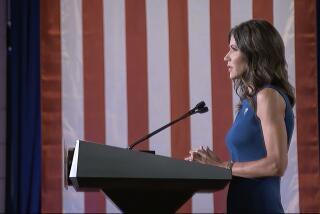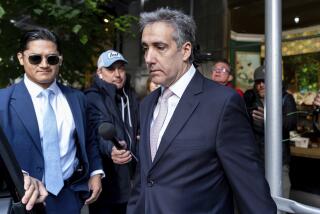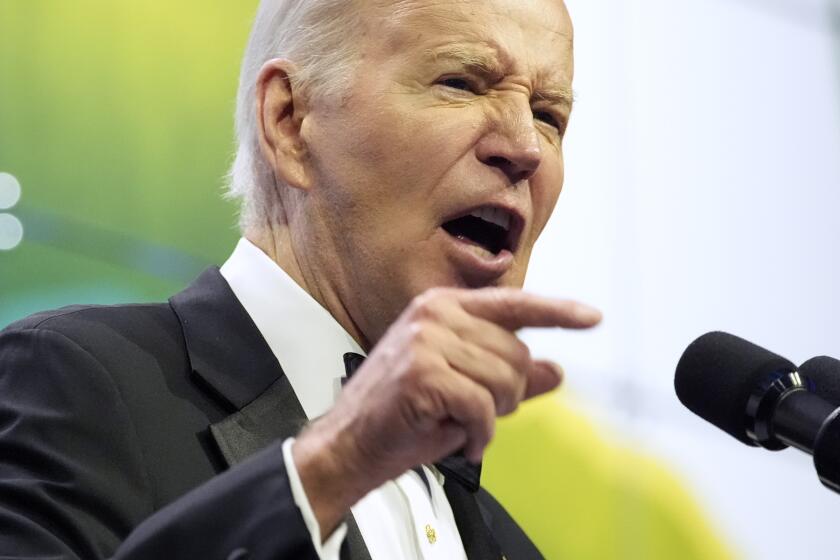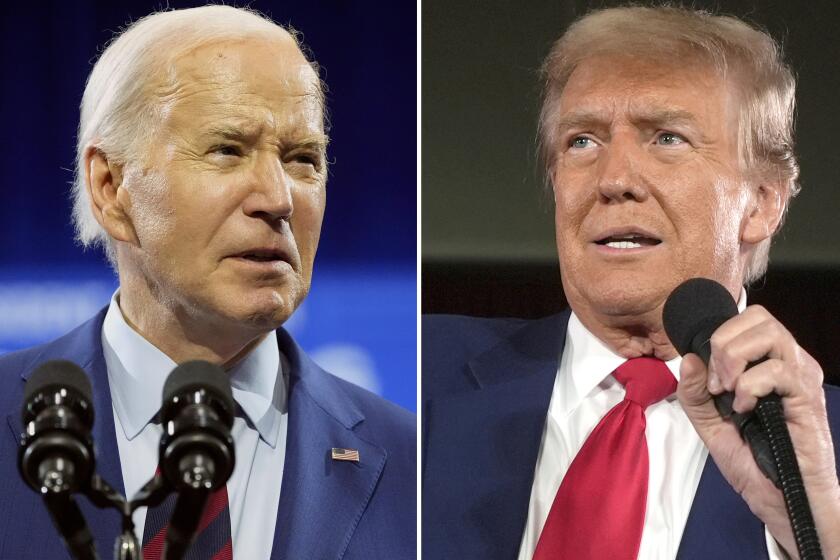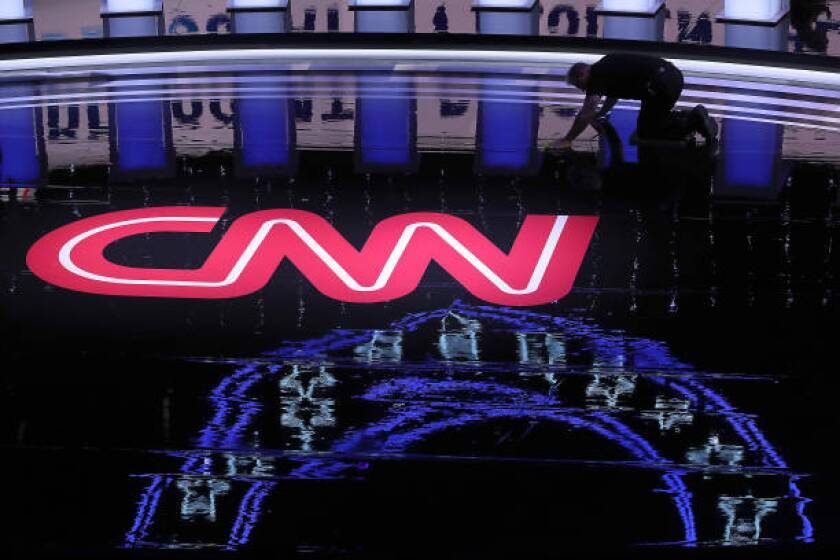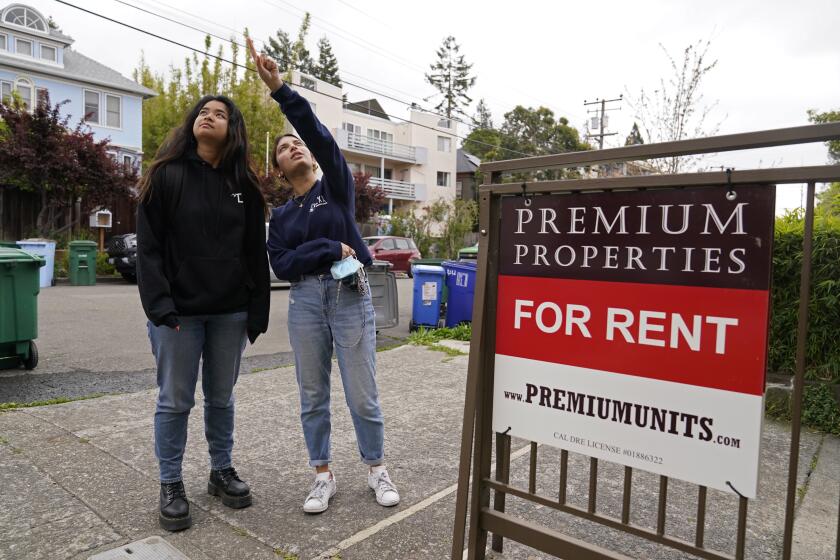Bustamante, Davis Depend on Many of the Same Donors
In his 10-year Capitol career, Lt. Gov. Cruz Bustamante has relied on many of the same sources to finance his campaigns as Gov. Gray Davis, tapping organized labor, gambling interests and clients of his lobbyist-campaign consultant.
Bustamante’s fund-raising pales compared to Davis’ and to that of most statewide officeholders. But he is beginning to raise more significant amounts of money as polls show that he has a solid chance of replacing Davis if the governor is recalled on Oct. 7.
Since he broke ranks with other Democrats and entered the race two weeks ago, Bustamante has raised $89,750, a fraction of the $10 million to $15 million he has set as his goal. Although Bustamante says he opposes the recall, he is competing with Davis for contributions from the same donors.
A review of his past fund-raising shows that, like many other officeholders, Bustamante has taken actions that benefited some of his donors, from pushing legislation for them during his days as an assemblyman to lending his official presence to their events while lieutenant governor. He also has shown a willingness to act against the interests of donors he once helped.
Bustamante has raised $5.7 million since first taking office as lieutenant governor in 1999.
“He is a ‘Mini-Me’ of Davis,” said Jamie Court, executive director of the nonprofit Foundation for Taxpayer and Consumer Rights in Santa Monica. “It is the same interest groups, only in different proportions.”
Campaign finance reports show that organized labor, Davis’ largest source of money and traditionally the largest donor to Democrats, provided $2.3 million of that sum.
Included in labor’s donations was more than $1 million from public employee unions, with the California Teachers Assn. contributing $293,000 and the union representing prison officers giving $104,000.
In Bustamante’s second run for lieutenant governor, in 2002, organized labor became his most generous donor. Since announcing his candidacy for governor, Bustamante has received endorsements, and promises of money, from unions representing carpenters, California Highway Patrol officers and roughly half of state employees.
“We like him, we think he’ll make a good governor ... and we’ve been known to make substantial contributions,” said Daniel Curtin, director of the California Conference of Carpenters.
Executives at the California State Employees Assn. said a final decision on how much to spend on Bustamante’s candidacy would be made by Friday. Union President Perry Kenny said his organization would at least meet the $21,200 maximum it could give directly to Bustamante. Kenny said the union is also considering spending money on his behalf.
“It’s a delicate thing,” Kenny said. “We don’t want to offend the governor. He’s our friend. But we also want to hedge our bets and we’ve always had a good relationship with [Bustamante].”
Aside from labor, Bustamante has relied heavily on contributions from gambling interests, primarily Indian tribes that own casinos. They have contributed $1.1 million to Bustamante since 1999.
Donors who identify themselves as lawyers, including trial attorneys who represent plaintiffs primarily in personal-injury lawsuits, accounted for another $475,000. Donors representing the health-care, development, telecommunications, oil and agriculture industries combined to give about $1.2 million.
In an interview Wednesday, Bustamante addressed fund-raising in generalities. His campaign did not respond to requests for an interview on specific donations.
Bustamante said that if he were governor he might, for instance, forgo fund-raising during the month at the end of legislative sessions when governors traditionally sign and veto hundreds of bills, many of which affect moneyed interests.
“Even if there isn’t an actual conflict, there appears to be,” Bustamante said, “and I think appearances oftentimes are as important as reality.”
During his tenure in the Assembly, from 1993 through 1998, Bustamante, like many lawmakers, took actions that helped his donors.
He was, for example, one of 42 Assembly members listed as coauthors of the 1996 legislation that shaped deregulation of California’s electricity industry.
In 1996, Bustamante accepted $35,000 from utilities in the state, including Southern California Edison and Pacific Gas & Electric. In 1998, as he campaigned to become lieutenant governor, Bustamante accepted $10,125 from Houston energy firm Enron, campaign finance reports show.
After the energy crisis hit California hard in 2001, Bustamante began accepting significantly less money from energy interests. He also filed a lawsuit against major energy companies. The lawyers he selected to represent him in the suit are among his donors, having given him $12,500.
“He is playing both sides of the street,” said Gary Ackerman, executive director of the Western Power Forum, which represents buyers and sellers of electricity.
Bustamante accepted $79,500 from the tobacco industry early in his career, including $60,000 after he had been elected speaker. In 1993, he voted against legislation that banned smoking in restaurants and bars. As speaker in 1997, Bustamante pressed for legislation to delay a ban on smoking in bars; the bill failed.
Later in 1997, as he began mounting his campaign for lieutenant governor, Bustamante introduced legislation that opened the way for California to join the nationwide lawsuit brought by states against the tobacco industry.
As lieutenant governor, Bustamante has little power to benefit donors. But the office does bring prestige.
One of Bustamante’s major donors is a chain of stores called Duty Free Americas Inc., which has given him $137,500 since 1999. Bustamante was a featured guest at the 2000 opening of the company’s store in San Ysidro. Representatives of the firm did not respond to a call from The Times.
Bustamante also lent the weight of his office to the Hollywood secession effort last year. Secession advocate Eugene La Pietra, one of Davis’ longtime donors, is also a Bustamante contributor, having given him $10,000 last October, four months after Bustamante’s endorsement.
“I’m a lifelong Democrat and I support all Democrats,” La Pietra said Wednesday.
Bustamante’s main campaign strategist is Democratic consultant Richie Ross, who has a lobbying business. Ross’ clients have been significant donors to Bustamante. Trial lawyers, two Indian tribes that operate casinos, and attorneys who represent injured workers combined have donated more than $430,000 to the lieutenant governor.
Bustamante said Wednesday that he can keep his distance from Ross: “I trust his judgment. But we also have a unique pact between us. The pact is that not all of his friends need to be my friends, and not all of my friends need to be his. And when I think he’s wrong, I tell him. And when I think he’s not giving me good advice, I don’t follow it.”
Under California campaign finance law, Bustamante cannot accept donations of more than $21,200 from individual contributors. But donors may spend unlimited sums on his behalf, as long as the candidate himself does not control those expenditures. And many of his donors have deep pockets.
California’s Indian tribes are among the most likely sources of big money. Bustamante was “one of the pioneers in collecting money” from tribes that operate casinos, said Jim Knox, director of California Common Cause, which issued a report in 2000 on campaign donations from gambling interests.
In his 1998 run for lieutenant governor, four of Bustamante’s top five donors were Indian tribes, Knox said.
Times staff writer Matea Gold contributed to this report.
*
(BEGIN TEXT OF INFOBOX)
Contributions race
These contributions were reported by major candidates on the recall ballot who have received sums of at least $100,000 to finance their gubernatorial campaigns.* A lesser-known candidate, venture capitalist Garrett Gruener, contributed $250,000 to his own campaign.
Cruz M. Bustamante
Total reported: $179,500 from 13 contributions
* Bustamante transferred $100,000 from his lieutenant governor campaign fund to his gubernatorial campaign. The Northern California Carpenters Regional Council, a political action committee, chipped in $21,200.
Arianna Huffington
Total reported: $150,500 from 30 contributions
* Huffington has relied heavily on smaller contributions, including many from individuals in the film and television industries. David and Suzanne Booth of Los Angeles gave $25,000 to Huffington in the same week that they contributed $42,400 to Schwarzenegger’s campaign.
Tom McClintock
Total reported: $230,000 from 60 contributions
* Shawn Steel, former California Republican Party chairman and outspoken recall advocate, contributed $1,000. Building contractor B&B; Framing Inc. of Moreno Valley contributed $20,000, while Rancho Framing in Riverside added another $20,000.
Arnold Schwarzenegger
Total reported: $2,286,300 from 17 contributions
* Schwarzenegger contributed $2 million -- 87% of the total -- to his campaign; his wife, Maria Shriver, contributed $21,200. Howard Keyes, a major Van Nuys automobile dealer, also added $21,200.**
Bill Simon Jr.
Total reported: $399,949 from 37 contributions
* Simon’s large family has contributed more than $85,000. Edmund H. Shea, vice president of a contracting company, contributed $5,000; a lawyer for the same company added another $5,000. Manchester Resorts in San Diego gave $21,200.
Peter Ueberroth
Total reported: $1,532,000 from 44 contributions
* Ueberroth gave $1 million to his campaign; relatives kicked in $84,800. Ueberroth relied heavily on contributions from Orange County residents; he received more than $200,000 from 24 donors in Laguna Beach and Newport Beach.
*
Two anti-recall committees, which are not subject to the same contribution limits as individual candidates, have raised more than $3 million to help Gov. Gray Davis. Taxpayers Against the Governor’s Recall, established in early June, reported receiving at least $2,373,665. Californians Against the Costly Recall of the Governor, formed in late July, reported raising at least $1,220,029.
* Davis transferred more than $500,000 from his gubernatorial campaign to Californians Against the Costly Recall of the Governor. E&J; Gallo Winery gave $100,000 to that committee; Norman Pattiz, chairman of the media group Westwood One Inc., donated $100,000.
* The California State Council of Service Employees union contributed $150,000 to Taxpayers Against the Governor’s Recall. Zenith Insurance Co. gave $100,000 to that fund, and entertainment executive Haim Saban, a major contributor to the Democratic Party, also contributed $100,000.
*Totals are for contributions larger than $1,000, the smallest donations that must be reported at this time.
**Contributions to candidates from outside sources are limited to $21,200. There is no cap on the amount candidates can give their own campaigns.
Source: Campaign reports filed with the secretary of state
Los Angeles Times
More to Read
Get the L.A. Times Politics newsletter
Deeply reported insights into legislation, politics and policy from Sacramento, Washington and beyond. In your inbox three times per week.
You may occasionally receive promotional content from the Los Angeles Times.
